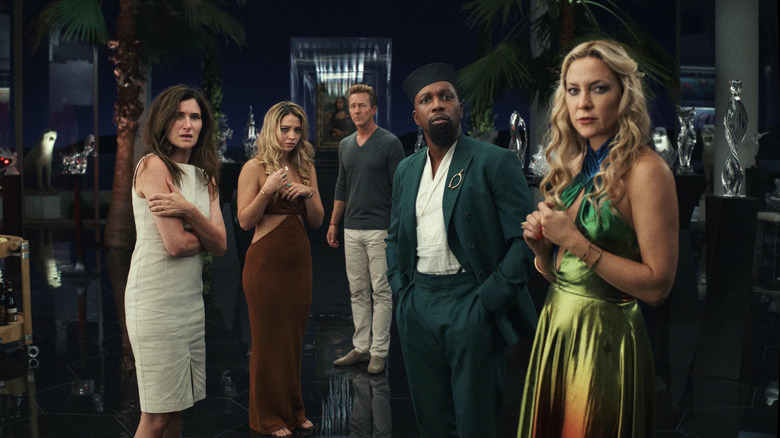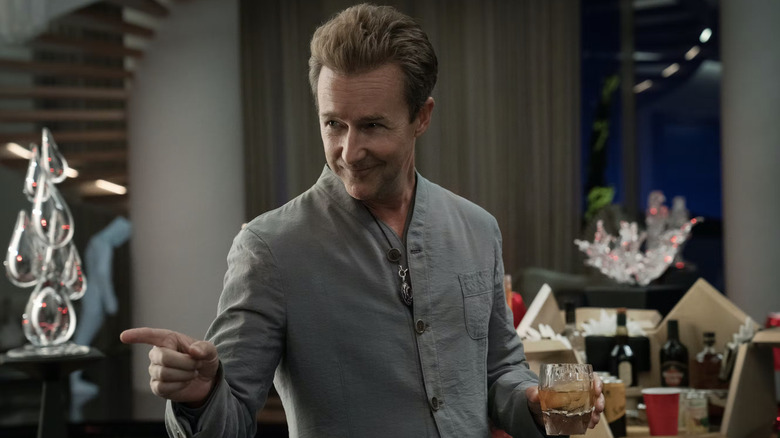Glass Onion Was 'Designed' To Be Watched A Second Time
This post contains spoilers for "Glass Onion."
Early on in Rian Johnson's follow-up to "Knives Out," it's clear that the penetrating mind of the gentlemen sleuth Benoit Blanc (Daniel Craig) is clearly no match for the rather dull-witted billionaire playboy Miles Bron (Edward Norton). In "Glass Onion," Miles invites his oldest frenemies to his private island sanctuary to play a meticulously planned murder mystery game where he is the victim. As we get to know a little backstory, some clear motives emerge that point to someone who really wants him dead.
The title itself is a reference to a song featured on The Beatles' "White Album" subtly making fun of the super fans that overanalyze the band's lyrics. Johnson's film is also making a comment that sometimes we look for the meaning behind something when there may not be anything to decipher. Miles represents this idea as well, as it's quickly revealed that he's not really a genius and there may be nothing behind his elaborate facade.
Subverting expectations is clearly something that Rian Johnson prides himself on, but the irony of "Glass Onion" lies in the fact that the simplicity and general stupidity of the actual crimes are clearly on display, especially in the first half of the film. Johnson's direction carefully hides clues in plain sight, making the story funnier instead of more complicated on a second viewing.
On the newest episode of The Filmcast podcast, Johnson talked about the challenge of showing the viewer everything and nothing all in the same shot.
Fake clues and real crimes
There's a tricky sleight of hand going on during the first hour of "Glass Onion," in particular. The expectation is that the obnoxious Miles will be killed for real, but there are actual clues and fake clues that have all been carefully orchestrated. In a hilarious twist on the detective cracking the case, Benoit Blanc's monologue early on completely ruins the game that Miles has planned. When Miles panics after Duke (Dave Bautista) is put in mortal danger, his incompetence and guilt are right there for everyone to see, if they look closely.
Rian Johnson told The Filmcast that it was important to make sure not to have any easy cheats that could be uncovered after a second watch. "In a way, I feel like the movie's almost designed more to be watched a second time than a first time," he said. "And we play, we play really, really fair in that first half, that's the other thing. It was a little scary, actually." There's a list of blunders you can plainly see, he revealed:
"I mean not just the glass switching, but there's so much stuff in there in terms of ... when Miles steals Duke's gun, it's ... he just does it. Birdie [Kate Hudson] is kind of in front of him but you can totally see him pull it out and just stick it in the back of his pants. When they're talking about where's Duke's phone, on the shot where he's saying 'It was just here, I don't see it,' Miles is like hopping up the couch and turning and the black phone is just sticking out of his back pocket."
All of these clearly visible details are used just to point out that Miles genuinely has no clue what he's doing.
Don't leave the audience guessing
With a new detective franchise on his hands, Rian Johnson knows that his audience is savvy. He doesn't want to pull the rug out from under them for no reason. The trick is not to outsmart anyone, it's ultimately to entertain. Watching "Glass Onion" over again, the goal is not to make the audience more confused because of some brilliant plot construction. Or to reinvent the murder mystery by deconstructing all of the usual tropes.
The devil really is in the details, and Johnson appears to be fully aware that he's walking a fine line with these seemingly complex storylines. The primary goal of a mystery thriller is to solve the crime without talking down to the audience. The characters, like Miles, can be dense and witless, but we can't ever feel that way. With the small details that become visible on a second watch, Johnson wanted to make sure he didn't miss anything visually that a viewer could point out easily.
If something doesn't make sense, it undermines everything. "It was important to me to that if people go back a second time and pay attention that they can see all that stuff is there. I dig that kind of stuff." "Glass Onion" is designed to tell another story with visuals that really help save it from any unnecessary plot holes or too many misdirects.
Hear more of this conversation with Rian Johnson and hosts David Chen, Devindra Hardawar, and Jeff Cannata on the new episode of The Filmcast.

